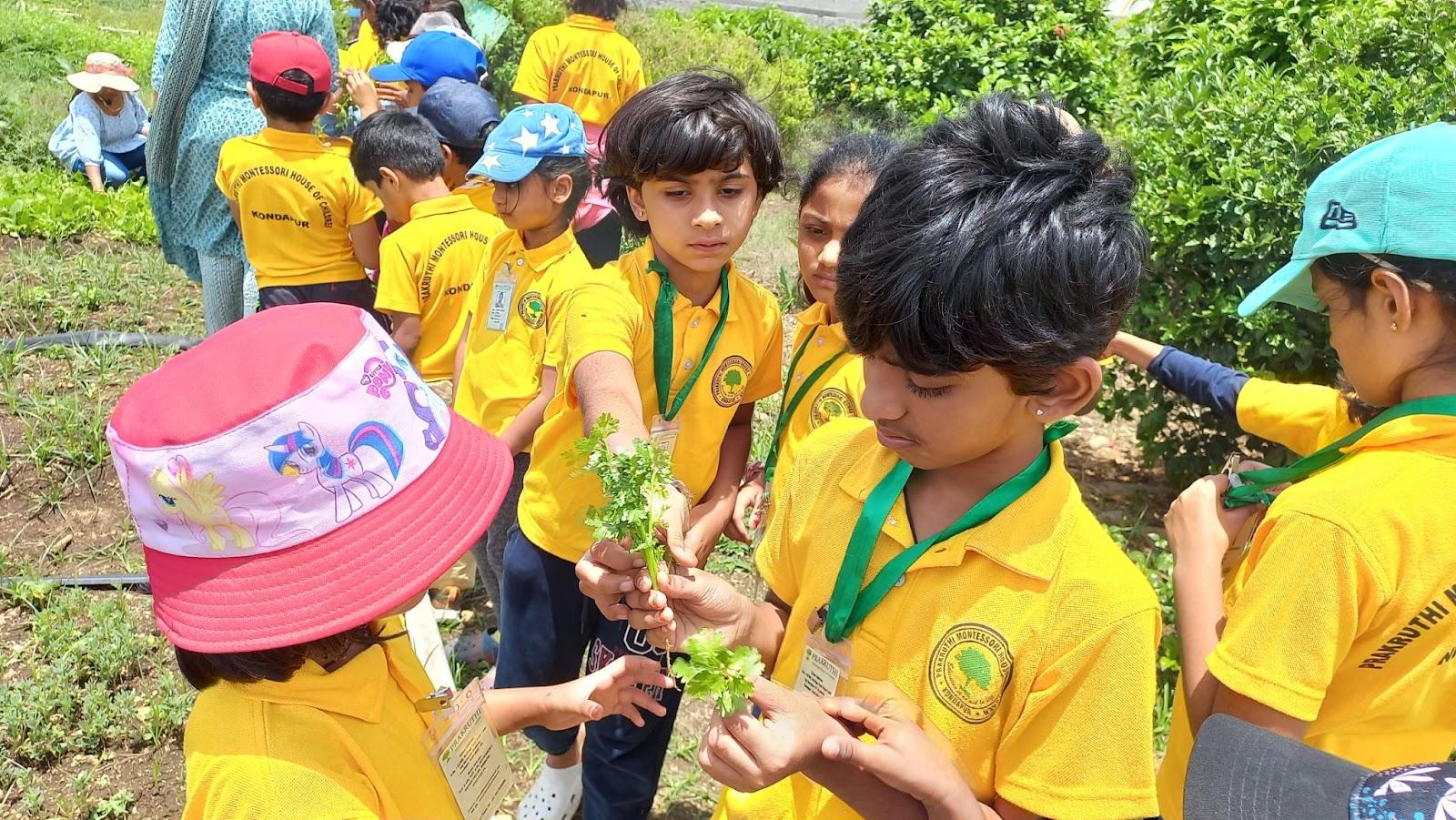The Case for Field-Based Learning
In today’s world of hyper-structured classrooms and digital distractions, children are becoming increasingly detached from the natural systems that sustain life. The result? A generation that knows about the environment but doesn’t feel connected to it. That’s where the power of purposeful field visits comes in. When learning steps outside the four walls—into farms, goshala trails, compost pits, and water harvesting sites—it becomes visceral, memorable, and life-shaping. These experiences don’t just complement curriculum; they root it in reality, turning abstract sustainability concepts into lived understanding.
Organo Et School’s field visit model blends sensory immersion with systems thinking, giving children of all ages the tools to ask better questions, build empathy, and begin acting as informed, responsible stewards of the Earth. It’s a proven, joyful approach to raising changemakers—one real-world experience at a time.
We believe that some of the most powerful learning happens outside the classroom—under the open sky, among trees, on farms, or in the midst of real-world experiences. For children, field trips aren’t just fun breaks from routine—they’re essential educational experiences that shape how they see and interact with the world.
Why Field Trips Matter at Every Age
From curious preschoolers to independent-thinking teens, every age group benefits uniquely from stepping into the real world:
Ages 4–6: The Explorers

Young children thrive on sensory experiences. A walk through a garden, a visit to a goshala, or planting seeds on a farm introduces them to textures, smells, and sights that no textbook can offer. These experiences nurture wonder, empathy, and a love for nature.
Ages 7–11: The Investigators

At this stage, children start asking deeper questions. Why does compost smell? How does seed come from leafy greens? Field trips provide the perfect context for hands-on inquiry, allowing them to connect abstract concepts with real-world systems.
Ages 12–15: The Thinkers and Changemakers

Adolescents begin to understand systems, impact, and responsibility. A visit to a sustainable farm or a recycling center helps them critically evaluate human-nature interactions and reflect on their own role in shaping the future.
Benefits of Field Trips Across Ages

1. Real-World Relevance
Seeing a water harvesting system or an organic vegetable garden makes lessons about sustainability come alive. Children understand that what they learn in books has direct implications on the planet and their daily lives.
2. Multi-Sensory Learning
Touching soil, hearing birds, tasting fresh produce—field trips engage all the senses. This leads to better memory retention, especially for kinesthetic and visual learners.
3. Social and Emotional Growth
Working together to identify insects or harvest crops builds teamwork, patience, and problem-solving skills. It also fosters empathy—towards animals, the environment, and peers.
4. Connection with Nature
Regular exposure to natural environments nurtures emotional resilience and a sense of belonging. Children who spend time in nature are shown to be calmer, more focused, and more compassionate.
5. Inspiration for Action
When children witness the work of farmers, conservationists, or green entrepreneurs, they are inspired to take small actions—be it recycling at home, starting a garden, or raising awareness in school.
Long-Term Educational Impact

Numerous studies show that students who participate in well-structured field trips:
Field trips transform passive learning into active exploration. They allow students to ask questions, make observations, reflect, and most importantly—feel connected to what they’re learning.
How OES Uses Field Trips as Learning Tools
At Organo Et School, field trips are not an add-on—they’re central to our STEL (Sustainability Through Experiential Learning) approach.
Our students have:

These visits help students explore the interconnectedness of essential systems—such as food, water, waste, and energy—and recognize how their everyday choices impact these systems.
Tips for Making Field Trips Meaningful

A Step Towards a Greener Future

Every field trip is an opportunity to connect the head, heart, and hands. For children, these outdoor, immersive experiences help build not just knowledge, but values—of care, respect, curiosity, and responsibility.
Let’s raise children who don’t just learn about the Earth but fall in love with it.
About Organo Et School (OES)
Organo Et School empowers people to embrace eco-living mindsets, behaviors, and habits. We recognize that for any positive impact to be sustainable, it must be long-term and inter-generational.
Organo Et School is a learning initiative set up by Organo in 2017 and has been facilitating field visits and workshops for Schools and Interest Groups. Organo Et School, an experiential learning initiative by Organo since 2017, has impacted over 8000 students, 2000 adults,1250 community residents, and 500 corporate employees.
Join us on our journey toward sustainable living by subscribing to our channel and following us on Instagram for the latest updates.
Email us at at oes@organo.co.in or call us at 91541 00775
Subscribe to our Youtube channel: https://www.youtube.com/channel/UCVe5InTKtgyGsGgNVNZ5sOw
Follow OES news on our Website: https://www.organoetschool.co.in
Follow OES on Instagram: https://www.instagram.com/organo_et_school/?hl=en